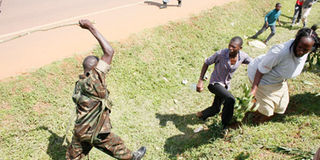Rights report faults Uganda

The UPDF has been cited in the report for violating human rights. FILE PHOTO
Just two days after President Museveni swore in for a fourth term in office, Amnesty International, (AI) a US-based human rights watchdog has released its 2011 global human rights report depicting Uganda in bad light.
The report 2011, released on Friday, documents various human rights violations by law enforcement agencies, including unlawful killings and torture, electoral violence, threats to free expression and assembly, violence against gender and sexual minorities.
On the eve of his swearing-in on Wednesday, the organisation issued an advisory urging the President to give priority in addressing similar vices in his new term.
Rejected
“In a September letter to the UN, Uganda rejected the findings of the UN mapping exercise highlighting violations of human rights and international humanitarian law committed within DR Congo between March 1993 and June 2003 by different armed forces and groups including the Uganda People’s Defence Forces (UPDF).
The government did not institute investigations into the allegations of human rights violations and crimes committed by the army,” the report further says.
But the UPDF spokesman, Lt. Col. Felix Kulayigye, called the report “unfair, biased and misinformed.”
“About Congo, you remember we had the Justice Porter Commission of inquiry and those allegations were fully investigated. Why don’t they point that out? ” he asked.
The report also points out unlawful killings and torture during the disarmament exercise in Karamoja. Mr Kulayigye said this was equally untrue since the investigation over the matter were carried out.
“We discovered that three officers including a captain and two lieutenants had tortured a civilian and extorted money from him. The money was returned to him from their salaries (officers) and they are undergoing prosecution.
“The UPDF can never condone impunity,” he added.
The AI report documents incidents of election related violations, the January manhandling of opposition women activists who demonstrated demanding resignation of the “biased Kiggundu” electoral commission.
The report comes at a time when Uganda is on spotlight over brutality of state agencies in quelling last month’s peaceful protests called to force government address skyrocketing prices of fuel and basic commodity prices.
Religious leaders, activists, lawyers and the public have voiced their concerns over the developments, in which 10 people including two-year juveniles were killed.
However, there seems to be no relenting as evidenced by battering oppositon supporters and journalists on Thursday as police and the army controlled the crowds along Entebbe road welcoming FDC leader Kizza Besigye from Nairobi.
The route was also used by dignitaries who were in the country for the President’s swearing-in.
Concerning free expression and assembly, the AI report said it was under threat due to the passing of the Interception of Communications Act 2010, the proposed Press and Journalists (amendment) Bill and various prosecutions against journalists.
The journalists’ bill if passed would provide for annual licensing of media houses and issue annual practicing certificates to journalists, which would be withdrawn any time the holders “act against national security.”
On a positive note, the report cites Uganda’s domestication of the Rome Statute, which obliges Uganda to prosecute individuals who have committed crimes against humanity before the International Court.
Approved
The President also assented to the Domestic Violence Bill which addresses domestic violence. Ms Sheila Muwanga, the Foundation for Human Rights Initiative deputy director in charge of programmes, said the organisation concurred with the report and called for serious action by government.




